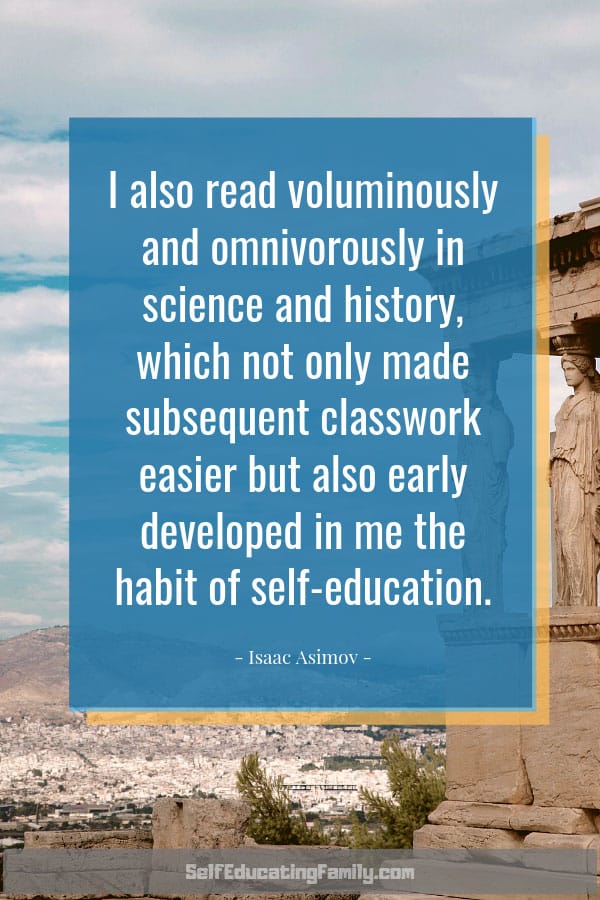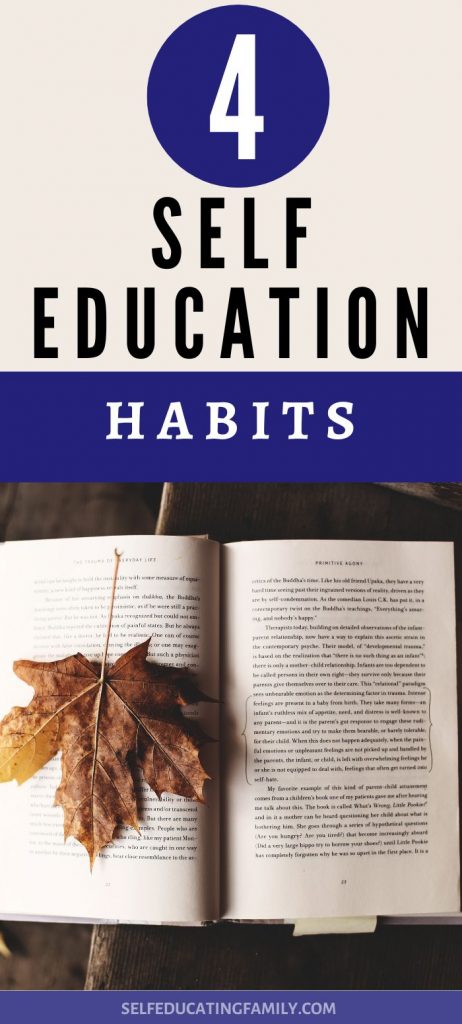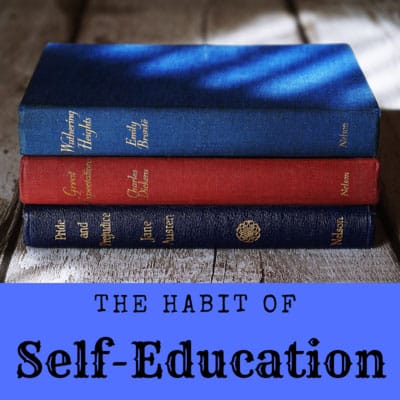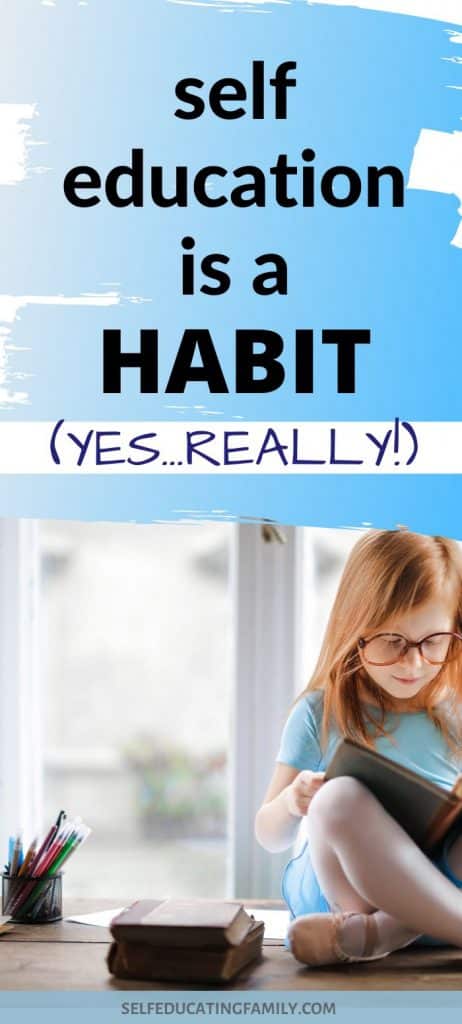What’s Inside: Self-education begins with the habit of reading. Learn how and why you should acquire this good habit to increase your education. And why you should help your children to do the same!
* This post may contain affiliate links. If you find my content valuable and make a purchase through one of my links, I will earn a commission at no cost to you, which helps me keep this blog going so I can help you even more! I recommend products I trust and/or use myself, and all opinions I express are my own. Read the full disclaimer here.
Isaac Asimov said that reading “voluminously and omnivorously”1 helped him to acquire the habit of self-education. Asimov, a prolific author and biochemistry professor, wrote over 500 books that have been published in 9 of the 10 classifications of the Dewey Decimal System used in our libraries today. I’m still wondering which category he missed!
A Look at Habits
What is the “habit” of self education? And why a “habit?” I believe habits are extremely powerful. Small habits, especially.
Take a morning routine habit, for instance. Morning habits can make or break a good morning. If you’ve established an easy habit of getting up, getting dressed, making your bed, and brushing your teeth, you learn to do these things automatically. You don’t even think about them. They are so easy, it just is what you do. Part of who you are. You don’t have to decide how you should make your bed or if you should brush your teeth. And so, your life has become easier because of a habit.
Now, think about passing along that good habit. What a gift to give to your child – an effortless habit of waking up with a good routine. Their teeth will thank you one day.
Good habits reduce decision fatigue
With good habits, you can help avoid decision fatigue. With so many choices and so much information in today’s technologically driven world, escaping weariness from information overload can be a positive thing.
Just make sure you don’t do something wildly crazy like going into a pharmacy to get a pack of bandages or some cold medication.
ARGH! I don’t know! Do I need the plastic, clear or sheer? Or the fabric? Or sports strips? Maybe the medicated active strips with waterproof and advanced healing? Or JUST forget it! I’ll just get some cough syrup. Or do I need a decongestant with nighttime sleep aid?
Hundreds of choices! Too much. I’ll just go home and bleed and cough on my couch.
The “Habit” of Self-Education
Habits. What if it were part of who you are and what you do to be a motivated self-educator? That’s what our family likes to cultivate. The habit of self-education. I’ve heard it called “life-long learning” or “self-directed learning.” And I’ve probably been doing it for most of my life.
Keep learning!
I love learning new stuff. That’s good for me because the amount of stuff that is out there to learn is phenomenal. Just go look up a few statistics. Over a billion websites? More than a hundred thousand libraries in the U.S? Almost 750,000 books were published in 2015 by just China and the U.S.? And don’t even mention the 50 million active reference files on YouTube. Though I’m not sure how many of those will help you learn something. Then again, I’ve used YouTube to learn dozens of things – from how to mix cement for tiling a bathroom to how to heat your chicken waterers using solar power.
How to Make Self-Education a Habit
How can we cultivate the habit of self-education? Asimov suggested that he did it by reading. And more reading. And even more. As an author and teacher, I’m sure he put all that reading into practice when he explained to others. That’s one of the best ways to learn something – by teaching it. (Look that one up yourself. Numerous ideas on that subject!)
It’s actually a bit overwhelming to write a concise argument for lifelong learning. And for habit making. And for specifically making the habit of self-education, especially as information continues to explode on the Internet. I mean, I can find dozens of well-crafted lists specifically on how to make learning a part of your life. So maybe this will become Part 1 of a seventeen-part series.
Favorite ideas
So, to get you started, here are my favorite ideas from a couple of top lists that I found:
- Always be reading a book. 4 (And I don’t mean Captain Underpants.)
- Apply what you learn. 5
- Be diligent. 6
- Grow your mind. 7
Isaac Asimov
“Self-education is, I firmly believe, the only kind of education there is.”2
Did he really say that?
Interestingly, Asimov was not the first to say that quote, nor the only person to say it. Sixteen years earlier, Robert Frost said, “I still say the only education worth anything is self-education.” 3 For a fabulous read on the history of this sentiment and who said what, I highly recommend sashaying over to Dr. Garson O’Toole’s website, the Quote Investigator.
And have fun when you do.

FAQ about Self-Education
I agree with Asimov. Start by reading. Lots and lots of reading of great books. Look at all the books my son read in 4 years of high school. You can go broad or go specific, depending on what you want to learn.
Charlotte Mason said, “There is no education but self-education.” This means the only way we learn is by taking it upon ourselves. For instance, in educating our children, Sonya Schafer says to ask yourself, “Who’s doing the work?” If the child is the one doing most of the effort, then they are learning to educate themselves. It’s a core value of Charlotte Mason homeschooling.
Thus, it is important to self-educate in order to learn.
More FAQ
Charlotte Mason said, “There is no education but self-education.” This means the only way we learn is by taking it upon ourselves. For instance, in educating our children, Sonya Schafer says to ask yourself, “Who’s doing the work?” If the child is the one doing most of the effort, then they are learning to educate themselves. It’s a core value of Charlotte Mason homeschooling.
Thus, it is important to self-educate in order to learn.
Skill vs. Habit. That’s a great question. I lean towards it being a habit. A life-long approach to keep learning things your whole life. CollegeInfoGeek thinks it’s a skill, but I think he’s self-educating in many skills and using good learning habits to do it. It may be a case of tomayto, tomahto. We both think it’s extremely important.
You tell me. What do you want to learn? The world is your oyster. Check out Scott Young’s exploits as an autodidact.
Keep Learning
Foot Note 1
1 Asimov said this in the article: 1975, Science Past, Science Future by Isaac Asimov, Chapter 27: How to Write 160 Books Without Really Trying, Start Page 204, Quote Page 208, Doubleday & Company, Garden City, N.Y. This footnote quotes the website http://quoteinvestigator.com/2016/07/07/self-education/#note-14042-8. Since this is my first blog post, I am going to have to direct my own self-learning toward how to actually give proper credit for quotes of quotes within a website. All I’m saying is that the Quote Investigator did all the superbly documented research. I just found his page. I’m glad that he got all this info!
Foot Note 2
2 Same citation as above. Back in the dark ages, when you had to type up reports on a typewriter (a.k.a.ancient keyboard/printer combination without electricity, spell-checker, monitor, or memory), we used the expression ibid. which is Latin for ibidem, meaning “in the same place”. In fact, You’d actually try to arrange your quotes so that you could ibid as many as possible, so you didn’t have to actually keep typing out the same lengthy citation, unless you were a fantastically speedy accurate typist. Which I wasn’t.
Foot Note 3
3 Again, I’m quoting from the same website page of the Quote Investigator, but his reference this time is from 1963, The Letters of Robert Frost to Louis Untermeyer, Year: 1958, Quote Page 376, Holt, Rinehart and Winston, New York. So can I use ibid to refer to the webpage even though it is a completely different original source? I could just reference the original source, but I didn’t find that. Definite shout-out to the QI.
All the Short Notes
4 From 15 Steps to Cultivate Life-Long Learning
5 Jun, Paul. Never Stop Learning
6 Shafer, Sonya. The Power of Good Habits
7 McKay, Brett & Kate. How and Why to Become a Lifelong Learner from the Art of Manliness.


